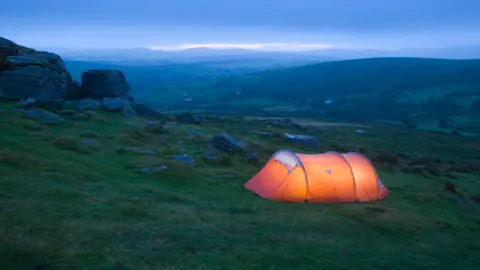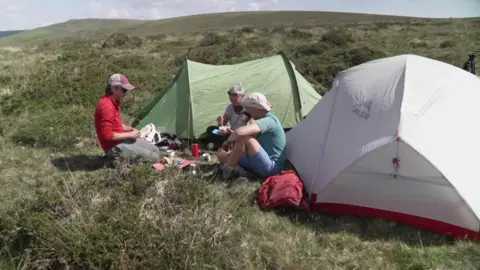Dartmoor wild camping 'not about fairy lights'
 Getty Images
Getty ImagesWild camping is "not about large tents and fairy lights" Dartmoor's authority has said after a court decision affirming the right to pitch a tent on the moor.
Supreme Court judges unanimously rejected an appeal by landowners Alexander and Diana Darwall who said people should not be able to camp without permission from landowners.
The Supreme Court ruling means that people are legally allowed to camp in set areas of Dartmoor if they follow a code of conduct.
Dartmoor wild campers are being urged to "tread lightly and leave no trace", by the park authority after the ruling.
'Sense prevailed'
Wild camping has long been legal in Scotland under the Land Reform (Scotland) Act 2003, but in England there is no general right to wild camp on most private land, with Dartmoor being an exception.
A code of conduct says tents and camping equipment must fit in a carriable backpack and no more than six people are allowed to camp together.
"It's only in certain areas, you can't just turn up and pitch up and it's not about large tents and fairy lights," Dr Kevin Bishop, chief executive of Dartmoor National Park Authority, told BBC Radio Devon.
"I'm certain that this case has put Dartmoor on the map for backpack camping, but please look at our website," he urged.
"Before you come check where you can go and what you can do."
Tom Backhouse, who grew up exploring Dartmoor, said the ruling was a chance to reconnect with nature, if done respectfully.
"We're guests on this land, the ecosystems and wildlife have been here far longer than us, so walking in and out without leaving a trace is vital," he said.
Mr Backhouse, who runs Campwild which promotes wild camping, said: "I'm genuinely pleased that sense prevailed on Dartmoor.
"People have enjoyed that land for centuries.
"Our hope is that responsible wild camping becomes a legal right in more places, just like in Scotland."

Emma Preece, a solicitor who represents landowners at Charles Russell Speechlys, said the ruling may lead to a short-term influx of campers, but she did not believe it would lead to a rise in irresponsible behaviour.
"Rural landowners need not panic," she said.
"The Supreme Court's decision won't open the floodgates as it is limited to the application of legislation specific to Dartmoor Commons.
"Landowners still have protections under other legislation.
"This isn't a green light for damage, it's a reminder of the balance between access and stewardship."
What are campers allowed to do?
- Tents and camping equipment must fit in a carriable backpack
- No more than six people are allowed to camp together
- Campers must blend into the landscape, out of sight from roads and buildings
- Maximum camping length is two nights
- No overnight stays in vehicles, campervans or motorhomes
- Leave no trace - do not light fires and take all rubbish away
Dr Bishop said: "It is important to note that it is not a blanket right to camp wherever, or do whatever, you want.
"With the right comes a responsibility to make sure that you tread lightly and leave no trace.
"We have been robust in defending the right to backpack camp, we will be equally robust in ensuring that people exercise that right responsibly and with respect to landowners and farmers.
"If you are thinking of backpack camping on Dartmoor it is important to follow the guidance on our website."
Richard Broadbent, environmental lawyer at national law firm Freeths, said bad behaviour by visitors to Dartmoor was partly down to access to wild areas being a rarity in England.
"We need a 'both-and' approach," he said.
"Yes to access, but also yes to education and responsibility.
"If we normalise outdoor experiences from a young age, we'll see fewer problems like littering or fire damage."
Follow BBC Devon on X, Facebook and Instagram. Send your story ideas to [email protected].
